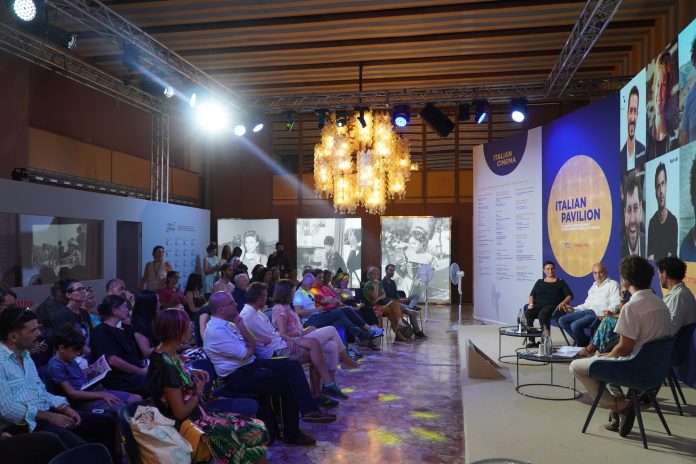by InTrieste
At the 81st Venice International Film Festival, the spotlight turned to Nova Gorica and Gorizia, two cities poised to make a significant cultural impact as they prepare to be named European Capitals of Culture in 2025. This week, an event titled “Corti senza Confine” showcased how these cities are blending their cultural legacies with contemporary storytelling.
The event, held at the Italian Pavilion — a space curated by Cinecittà for Italy’s Ministry of Culture — offered a first look at eight short film projects selected through the “Corti senza Confine” competition. These films, which are currently under production in the Gorizia region, were introduced with a teaser preview, highlighting the diverse and innovative narratives that the filmmakers are developing.
The “Corti senza Confine” initiative, a collaborative effort between the Central Directorate for Culture and Sport of Friuli Venezia Giulia and the Friuli Venezia Giulia Film Commission, forms part of a larger program designed to celebrate the European Capital of Culture designation. The initiative aims to create original cultural works that will not only celebrate the significance of 2025 but also leave a lasting cultural impact.
The selected short films will be featured throughout 2025 as part of the “GO! 2025” program. Chiara Valenti Omero, coordinator of the FVG Film Commission, expressed hope that these films will gain recognition at prominent national and international film festivals, given their high caliber.
Mario Anzil, Vice President and Culture Commissioner of Friuli Venezia Giulia, highlighted how “Corti senza Confine” aligns with the region’s cultural vision. He emphasized that the region, historically defined by borders, is uniquely positioned to redefine the concept of “border” as an opportunity for fostering international connections rather than division.
Winning Films Unveiled
Out of 151 applications from across Italy and Europe, eight projects were selected, each receiving a grant of up to €100,000. The jury, led by acclaimed director Gabriele Salvatores, praised the films for their unique approaches to exploring the theme of “absence of border.”
Among the winning entries:
- “Gorizia” by Simone Massi stands out as the only animated work. Utilizing his distinctive oil pastel technique, Massi depicts Piazza Transalpina/Trg Evrope as a symbolic crossroads where historical and future narratives intersect.
- “L’estate che verrà” by Mauro Lodi portrays a touching friendship between an Italian and a Slovenian, raised in a culturally cohesive environment but facing the impending threat of war. The film underscores the power of personal relationships to transcend borders.
- “Dall’altra parte – favola di Aulo e Marina” by British-Australian director Emma Jaay is a modern fable exploring themes of roots and borders. The film offers a poetic reflection on human connections that transcend geographical divisions.
- “La battaglia delle spazzole” by Lorenzo Fabbro blends irony and realism in a comedic exploration of the nighttime routine of two street sweeper operators. The film turns their mundane tasks into a battle of invisible borders and unexpected emotions.
- “Vivere” by Chiara Cremaschi embarks on a visually intense and introspective journey, exploring life’s complexities through the experiences of two women. The project is based on extensive research and collaborations with French geographer Camille Schmoll and artist Martina Melilli.
- “L’Osservatore Romano” by Alberto Fasulo examines the subtle tensions between an elderly former nobleman and a mysterious observer in Piazza della Transalpina, combining comedy, drama, and a nod to Sergio Leone’s westerns.
- “Ricordati di me”/“Spomni se name” by Davide Del Degan, written by Alessandro Biamonti, explores the physical and metaphysical boundaries, illustrating their distorted representations of human reality.
- “Gregorio” by Giacomo Bendotti, a directorial debut, narrates the return of an elderly man to his childhood home, reflecting on migration and the evolving nature of borders as either walls or bridges.
Sergio Emidio Bini, Regional Councillor for Productive Activities and Tourism, concluded the event by noting that “Corti senza Confine” will play a crucial role in promoting Nova Gorica, Gorizia, and the broader Friuli Venezia Giulia region. The FVG Film Commission has seen a notable increase in project support and funding, underscoring its pivotal role in regional cultural and tourism promotion.





























